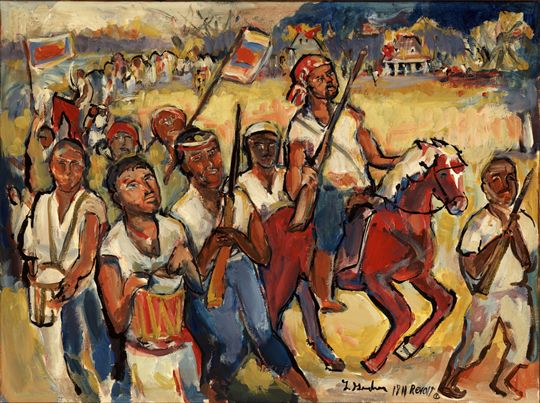
On the 213th Anniversary of Louisiana's 1811 Slave Revolt, Why It Still Matters for Education in New Orleans
This week marks the 213th anniversary of Louisiana’s 1811 Slave Revolt in New Orleans, also known as the German Coast uprising. On January 8, 1811, when Charles Deslondes led 500 men and women down River Road in the nearby parishes of St. Charles and St. John the Baptist, armed with axes, hoes, knives and a few small arms chanting “On to New Orleans” and “Freedom or Death,” they weren’t just heroically resisting the savage exploitation and brutal oppression of slavery. Their aim was to build a second independent Black republic similar to Haiti. Haiti’s 1805 Constitution was the world’s first governing document written in the interest of a non-landowning, Black majority and containing within it a code of ethics for what it means to be a good citizen, parent, spouse, and soldier. As such, this document was a major influence on the 1811 revolutionaries. As one of my mentors, the New Orleans historian and author Leon A. Waters has noted, the revolutionaries’ aim to build a new system is the most important idea about the 1811 rebellion and is also the one that has been the most suppressed in the teaching of it.
Whew! The audacity of these revolutionaries still gives me chills. Talk about being Afro-futurist. I first learned about this history in 1996 and it has been my constant obsession ever since. Back then, I was a student at McDonogh #35, a historically Black institution established as Louisiana's first high school for Black students in 1917. I’d transferred there from a racially diverse magnet school in New Orleans where I endured a year-long course in Louisiana Studies (still a requirement) that never mentioned anything about the uprising (still a common experience for children in our state). It wasn’t until I got to my all-Black high school in a class co-taught by two native sons - one, a Black Arts Movement poet and founding member of Free Southern Theater; the other, the son of a Baptist preacher and former New Orleans Teacher of the Year who we joked looked like Jesus (the white version) - that I learned anything about this local act of resistance which has been described as the largest slave rebellion to happen in the United States. When these two teachers - Kalamu ya Salaam and Jim Randels - taught my classmates and I about the 1811 Uprising they used a pedagogical approach they were co-developing alongside their students that would eventually emerge as the Students at the Center (SAC) program. University of California, Santa Barbara Black Studies professor George Lipsitz describes SAC this way:
“Building directly on the Black resistance traditions of New Orleans, Students at the Center involves young people in social movement activism as a routine part of their studies in order to provide them with what SAC teacher Kalamu ya Salaam describes as “education for liberation, not mainstream socialization”…Inside a school system that requires teachers to drill students constantly to prepare for standardized tests, SAC instead pursues a pedagogy based on student-centered interactive and collaborative writing assignments as well as on shared social justice work.”
SAC operated in New Orleans public schools for 25 years until several corollaries of post-Katrina education reforms - specifically the measurement cult (that started with No Child Left Behind); the endemic lack of understanding of child development; ideological aversion to neighborhood-based approaches; and highly scripted teacher training programs void of extended discourse - made its work impossible.
Of course, I didn’t know any of this in 1996. But what I sensed in that moment (and the sensibility has followed me ever since) is that not teaching the history of Black people’s resistance to the experience of enslavement and its enduring legacy facilitates the degradation of Black community life. I explored this connection in an essay about the 1811 Slave Revolt and the dispossessions which followed Hurricane Katrina. Now, after 20+ years working in education and more than 6 years serving as executive director of Black Education For New Orleans (BE NOLA), I can see even more clearly that the erasures which still exist in the official curriculum are further accomplished through the discrediting of Black educators, the distancing of teaching and learning from Black culture/ community life, and the destruction of Black educational institutions. And we can see the accelerating degradation of Black community conditions, where many metrics of child poverty, grade-level literacy, housing access, juvenile crime, and mental health outcomes are stagnant or worsening. Thus the schooling project can become a killing field. These are the stakes.
Learning, knowing, and teaching the way these revolutionaries resisted their oppression to imagine a new future, is a source of much-needed inspiration for the practical matter of reimagining education in New Orleans in 2024. (What psychologists would call "elevation.") Despite the hype, we are nowhere close to where we need to be in ensuring a quality education for every child in New Orleans. Until we develop a shared knowledge about the erasures, dispossessions, and dispersals that led us here, our solutions to the enduring challenge of the so-called “achievement gap” (by the way, it’s really an “education debt”) will only ever be partial. The very act of excavating the 1811 Slave Revolt in the classroom is a way to ignite a more inclusive conversation about where we go from here. This is urgent for New Orleans, where the current education regime tends to dogmatically make the case for school choice approaches we know are not working as they should, drowning out other possibilities. What if school choice and charter schools are not synonymous? What if charter schools and quality education are not synonymous? What if quality education and standardized test scores are not synonymous? The boldness of the 1811 revolutionaries lies in their courageousness to raise fundamental questions about the ideologies shaping their institutions and design a better vision. My obsession with this history won’t be leaving me anytime soon.
Resource List:
- “What was the aim of the revolt?”, Leon A. Waters, Louisiana Museum of African American History
- “Jan. 8, 1811: Louisiana’s Heroic Slave Revolt,” Leon A. Waters (Zinn Education Project)
- The Long Ride, 2nd edition, Students at the Center
- “Why the 1811 Slave Revolt Matters,” Adrinda Kelly
- Amistad Research Center, African American History Alliance Collection, 1811 Slave Revolt (Box 1, Folder 2)
- On to New Orleans! Louisiana’s Heroic 1811 Slave Revolt, Albert Thrasher
Click here to explore the work BE NOLA is doing to ignite the Black brilliance that exists in schools and neighborhoods through initiatives like the Black Is Brilliant Summit and Black Is Brilliant Institute founded by my amazing co-leader Stevona Elem-Rogers.
Adrinda Kelly is the Executive Director of Black Education For New Orleans (BE NOLA).
